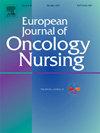Factors contributing to sexual dissatisfaction in women with breast cancer: The specific role of conjugal relationship quality
IF 2.7
3区 医学
Q1 NURSING
引用次数: 0
Abstract
Purpose
The purpose of this study was (1) to investigate the personal, interpersonal, social, and cultural factors related to sexual dissatisfaction in women with breast cancer and (2) to explore these differences regarding surgery (lumpectomy vs. mastectomy).
Methods
This cross-sectional study included women diagnosed with breast cancer (n = 87). Women were invited to complete questionnaires assessing sexual satisfaction, relationship satisfaction, conjugal support, quality of life, subjective health, anxiodepressive symptomatology, body image, self-esteem, and religiosity. Partial least squares path modeling (PLS‒PM) was used.
Results
No direct links were observed between resources (intraindividual and social) and sexual dissatisfaction (SD) or between vulnerability (physical and emotional) and SD. The quality of the conjugal relationship acted as a mediator between these different variables. Intraindividual resources are influenced directly by physical and emotional vulnerability. Age influenced only SD in women who had undergone a lumpectomy compared with those who had undergone a mastectomy. Finally, religiosity and the length of the couple relationship had no influence on SD.
Conclusion
The results highlight the importance of considering different levels of variables when considering SD in women with breast cancer, particularly the role of the conjugal relationship. Hence, these results encourage the need to promote conjugal relationship quality to improve sexual satisfaction.
导致女性乳腺癌患者性不满的因素:夫妻关系质量的具体作用。
目的:本研究的目的是(1)调查与乳腺癌女性性不满意相关的个人、人际、社会和文化因素;(2)探讨手术(肿块切除术与乳房切除术)方面的差异:这项横断面研究包括确诊患有乳腺癌的女性(n = 87)。女性受邀填写问卷,评估性满意度、人际关系满意度、配偶支持、生活质量、主观健康状况、焦虑抑郁症状、身体形象、自尊和宗教信仰。研究采用了偏最小二乘法路径模型(PLS-PM):在资源(个人内部和社会)与性不满(SD)之间,或在脆弱性(身体和情感)与性不满(SD)之间,均未发现直接联系。夫妻关系的质量是这些不同变量之间的中介。个人内部资源直接受到身体和情感脆弱性的影响。与接受乳房切除术的妇女相比,年龄只对接受肿块切除术的妇女的 SD 有影响。最后,宗教信仰和夫妻关系的长短对 SD 没有影响:研究结果突出表明,在考虑乳腺癌妇女的 SD 时,考虑不同层次的变量非常重要,尤其是夫妻关系的作用。因此,这些结果鼓励人们需要提高夫妻关系的质量,以提高性满意度。
本文章由计算机程序翻译,如有差异,请以英文原文为准。
求助全文
约1分钟内获得全文
求助全文
来源期刊
CiteScore
4.40
自引率
3.60%
发文量
109
审稿时长
57 days
期刊介绍:
The European Journal of Oncology Nursing is an international journal which publishes research of direct relevance to patient care, nurse education, management and policy development. EJON is proud to be the official journal of the European Oncology Nursing Society.
The journal publishes the following types of papers:
• Original research articles
• Review articles

 求助内容:
求助内容: 应助结果提醒方式:
应助结果提醒方式:


